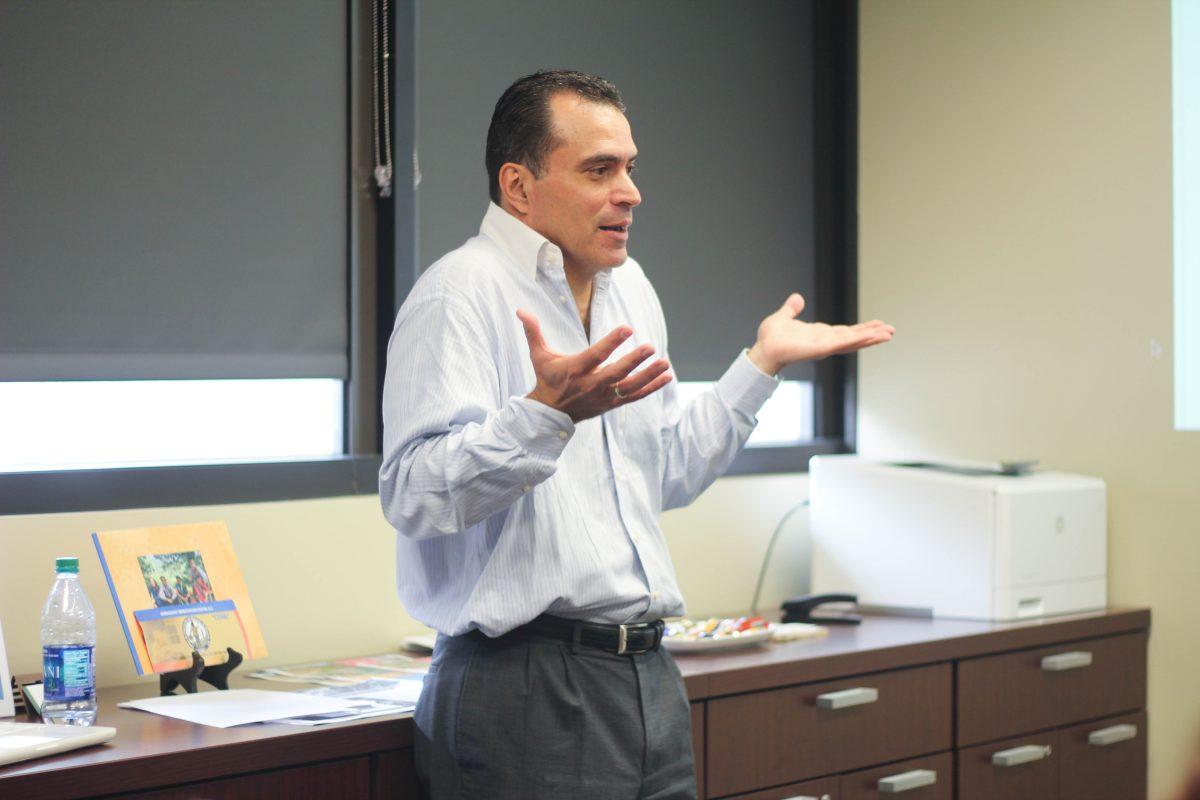This fall semester, the former second vice president of Costa Rica is teaching a graduate-level course at UTD that focuses on maintaining citizen security and tackling crime in Latin America.
In addition to serving as second vice president, Kevin Casas-Zamora also served as minister of national planning and economic policy in Costa Rica and continued to be involved in politics and public policy after his tenure. Casas-Zamora said working in the Costa Rican government sector gave him satisfaction in serving his country.
“It’s a wonderful experience in the sense of being able to give back to your country,” he said.
Jennifer Holmes is a public policy, political science and political economy professor and a faculty advisor at the Center for U.S. Latin American Initiatives, an organization that promotes research and understanding about issues in Latin America to UTD students. In the past, she connected with Casas-Zamora, a distinguished scholar-in-residence through CUSLAI, and kept in touch.
Holmes and Casas-Zamora met in 2004 at the European Consortium for Political Research conference during a reception. After talking with him during the conference, Holmes continued to correspond with him. She then recommended Casas-Zamora to CUSLAI director Monica Rankin to speak about Latin American issues.
“It’s unusual to find somebody who’s at that level but still accessible, so he was the perfect guy to bring out,” Holmes said.
In 2015, the CUSLAI invited Casas-Zamora to lecture on Prospects for Democracy in Latin America, and he had a meet and greet with students afterwards. After experiencing student interest and enthusiasm about the topic, he said he wanted to come back and teach as a visiting scholar.
“I was very impressed by the quality of the students,” Casas-Zamora said. “So when this opportunity arose of spending here a part of a semester, I didn’t think twice.”
The faculty of CUSLAI worked with Casas-Zamora to accommodate his schedule so he could teach students in the fall and hold events and lectures later at UTD during his visit. Rankin and Holmes worked towards this initiative for over a year.
“Sometimes you get the opportunity to dig deep in a topic like this with an expert in a small group,” Holmes said. “Having the opportunity to really spend time with somebody who’s had experience in those areas is invaluable for people who want to make career decisions.”
Casas-Zamora was later invited to lecture as the first CUSLAI distinguished scholar-in-residence for the current fall semester for a graduate-level class on Citizen Security in Americas. He wanted to visit for two months, so Rankin and Holmes felt an eight-week seminar focusing on special topics would be appropriate for him to teach. The course addresses challenges regarding crime, the underlying factors that explain high crime rates in Latin America and problems that inhibit the criminal system from functioning at its best.
“Perhaps more importantly, I’ll discuss with the students on what is to be done,” Casas-Zamora said. “There are no easy answers. There’s no silver bullet to counter as deteriorated a crime situation as we find in Latin America.”
Casas-Zamora said crime in Latin America was a difficult problem because of the lack of credibility of the law enforcement, making crime more common in these regions. He said that at a local level, policies are often maintained more efficiently, demonstrating that crime is possible to control.
“Crime is an encroachment on basic citizen rights … so it’s all about the ability of the state to secure those rights,” he said.
CUSLAI research assistant Pedro Gonzales said that he believes that Casas-Zamora will provide knowledge on the practical aspects of Latin-American initiatives and working in the government sector.
“There’s another part, which is the practical approach where you work in the government, represent a state, make public policy,” Gonzales said. “And I think he’s got that experience and he can provide that contribution to the construction of knowledge from a different angle.”
While the course is only available to current UTD graduate students, Casas-Zamora said he plans to promote more awareness for Latin-American issues and initiatives through other lectures and events open to all UTD students as part of the CUSLAI. By the end of the course, he said he hopes that students have a change in perspective and understanding regarding issues with crime and citizen security in Latin America.
“I’m hoping that the students will come out with a sense of the enormity of the challenge of crime in Latin America, but also that they will walk out with the notion that something can be done,” Casas-Zamora said.

















